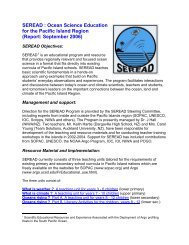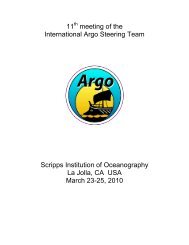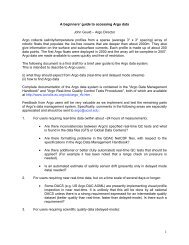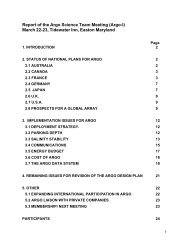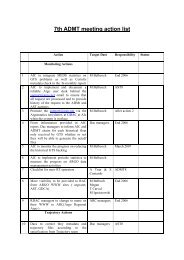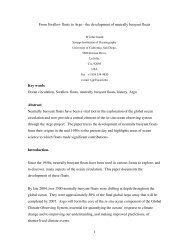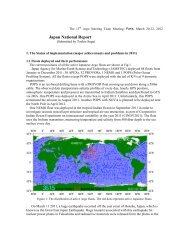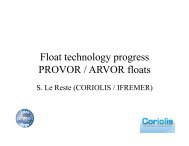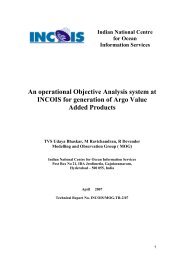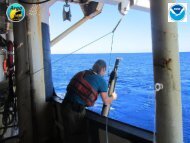AST-12 meeting report posted - Argo
AST-12 meeting report posted - Argo
AST-12 meeting report posted - Argo
You also want an ePaper? Increase the reach of your titles
YUMPU automatically turns print PDFs into web optimized ePapers that Google loves.
suspect or bad data floats (13) floats<br />
Unknown 3 23<br />
Grounded and contaminated CTD 3 23<br />
Biofouling 2 15<br />
Druck microleak 2 15<br />
Suspect conductivity cell 1 8<br />
Buoyancy problems 1 8<br />
Ice damage 1 8<br />
Summary of Technical Issues<br />
Faulty Solenoids<br />
We have been having problems with the solenoid switch on the air pumps not working<br />
properly so that the valve does not shut off and does not maintain air pressure in the bladder.<br />
The problem can be identified in the lab when the bladder pressure equals the vacuum<br />
pressure. A couple of floats (2-3) have been identified with this problem in the lab during<br />
pre-deployment testing. The problem cannot be easily identified once floats are in the field as<br />
it is not possible to determine the difference between a failed air pump and a failed air pump<br />
switch.<br />
The failure rate for solenoids from the Italian supplier went up drastically after they changed<br />
their manufacturing process to eliminate oil on the switch (previously Webb had been<br />
cleaning this off themselves). The manufacturing process has now been changed but at least<br />
54 of our floats are potentially affected. Solenoids will be replaced where possible, depending<br />
on the amount of replacement solenoids available from the manufacturer. Priority for<br />
replacement will be given to Iridium floats and those deployed in the tropics.<br />
Miscellaneous Float Problems:<br />
• Two floats had faulty CPUs, the boards were returned to Webb. This seems to be a<br />
relatively rare problem.<br />
• One oxygen calibrated float had a corroded seal; the source of corrosion was unclear.<br />
• One float delivered with the wrong model GPS hardware that was not compatible<br />
with the version of firmware and did not work at all. This was picked up in the lab<br />
before deployment and was replaced.<br />
• Two Iridium floats have had GPS problems – they had low signal strength and the<br />
GPS units were replaced in the lab.<br />
• One float had a weak Iridium signal caused by an unreliable low frequency band<br />
transmitter not communicating with the CPU and resulting in poor uplink.<br />
• Poor Iridium communications – we reduced the log file size from 60K to 5K which<br />
has helped make the communications more reliable but sometimes results in not all<br />
the diagnostics we need being transmitted if the message file doesn’t arrive.<br />
• We have also had problems with inadequate fluorometer calibrations on the<br />
Fluorometer Backscattering Meter (FLBB) sensors. Testing in the lab when the floats<br />
arrived showed the sensors were not calibrated properly. We found differences<br />
between the data readings from the sensor and those transmitted through the float.<br />
Also, there was a significant warming up period required before the readings<br />
stabilised. The problem sensors were sent back to Webb for recalibration and in some<br />
cases were sent back a second time.<br />
45




